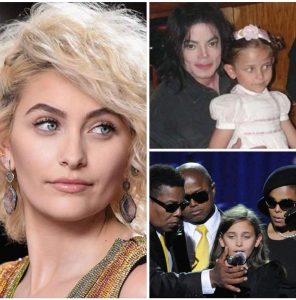Paris Jackson, the daughter of the legendary pop icon Michael Jackson, recently spoke about her African-American heritage, expressing her deep sense of pride in her roots while also addressing the criticism she has faced over the years.

Born in 1998 to the “Billie Jean” singer and Debbie Rowe, Paris, now 25, has spent much of her life in the public eye. Speculation has long surrounded the biological parentage of Michael Jackson’s three children—Paris, Bigi, and Prince—primarily due to their appearance. Many have pointed out that they do not strongly resemble their late father, with Paris, in particular, drawing attention for her fair complexion, light-colored eyes, and most recently, her blonde hair.
Despite the ongoing rumors, Michael Jackson was a devoted father who worked diligently to shield his children from the relentless scrutiny of the media. His methods, however, were unconventional. He famously covered his son Bigi’s face with a blanket whenever they appeared in public, a practice that led to teasing from peers as Bigi grew older. Now, as an adult, Bigi prefers to go by that name rather than his given name, Blanket.
Following Michael Jackson’s tragic passing in 2009, his children were thrust into the public eye like never before. The media’s fascination with them only intensified, with paparazzi eagerly capturing their every move. This constant exposure took a significant toll on Paris, contributing to her struggles with post-traumatic stress disorder (PTSD).
Paris has been open about her mental health journey, sharing that she has undergone therapy to address various issues, including frequent auditory hallucinations—particularly the sound of camera shutters clicking—and severe paranoia.
At just 15, Paris attempted suicide multiple times, leading to a period of intense self-reflection and ultimately, admission to a treatment center in 2019. She has spoken candidly about battling self-hatred and crippling low self-esteem, feelings that once made her question her own worth.
Despite these struggles, Paris has emerged as a resilient and accomplished woman. Following in her father’s footsteps, she has carved out a successful career in music. Over the years, she has also stepped into the fashion world, walking the runway for major brands such as Chanel. As a musician, she is a member of the band The Soundflowers, embracing a folk-indie sound that distinguishes her from the pop legacy of the Jackson family.
In a 2020 interview, she reflected on her musical journey, saying, “Everyone in my family is into music. Being a Jackson, it was inevitable that I’d pursue it. But I think it’s pretty unexpected for a Jackson to be in folk indie.”
Beyond her career, Paris shares a strong bond with her brothers, particularly Prince. In a 2020 interview with People magazine, she spoke about their close relationship, saying, “He means the world to me. I’ve always looked up to him, sought his approval, and wanted to be just like him.”
Prince has reciprocated the sentiment, expressing immense admiration and support for his younger sister. He has described her as being a reflection of their father, noting that aside from age and gender, she shares many of Michael Jackson’s strengths—and some of his weaknesses. He emphasized her passionate nature, a trait that mirrors the King of Pop’s own intense dedication to his craft.
Michael Jackson’s physical appearance changed significantly throughout his life, fueling speculation that he had intentionally lightened his skin. While many assumed he underwent cosmetic procedures, Jackson maintained that he suffered from vitiligo, a medical condition that causes depigmentation. In a 1993 interview with Oprah Winfrey, he firmly stated, “I am proud of my race. I am proud of who I am.”
Paris has echoed her father’s sentiments, embracing her identity and heritage. In a 2017 interview with Rolling Stone, she opened up about identifying as Black, recounting how her father instilled in her a sense of pride in her background.
“People who don’t know me often assume I’m white. I have fair skin, and with my hair dyed blonde, I probably look like I’m from Finland,” she said. “But I trust what my dad told me. He never lied to me.”
Her comments sparked controversy, with some critics questioning her racial identity. Among them was talk show host Wendy Williams, who argued that racial identity is largely based on how one is perceived by society.
“She can identify however she wants, but I’m looking at appearance,” Williams stated. “Being Black isn’t just about what you call yourself—it’s about how you’re treated, especially in difficult or dangerous situations. That’s what really matters.”
Despite the criticism, Paris has remained steadfast in her beliefs, embracing both her individuality and her family’s legacy. Her journey has been marked by struggles, but also by resilience and personal growth.
Today, she continues to thrive in both music and fashion while staying true to herself. Her story serves as a testament to perseverance, identity, and the power of self-acceptance.
If you found this article insightful, feel free to share it with your loved ones on Facebook.





